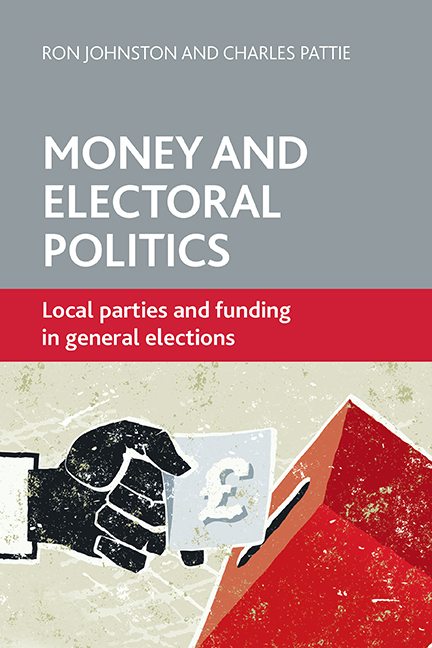Book contents
- Frontmatter
- Contents
- List of tables and figures
- About the authors
- Introduction
- one Follow the money: cash, party and electioneering in Britain
- two Money matters: local campaigns at British general elections
- three The financial health of local parties: the key to electoral success?
- four Raising the money: donations to local parties
- five Party funding futures
- In conclusion
- References
- Index
Introduction
Published online by Cambridge University Press: 24 February 2022
- Frontmatter
- Contents
- List of tables and figures
- About the authors
- Introduction
- one Follow the money: cash, party and electioneering in Britain
- two Money matters: local campaigns at British general elections
- three The financial health of local parties: the key to electoral success?
- four Raising the money: donations to local parties
- five Party funding futures
- In conclusion
- References
- Index
Summary
In the short three-week campaign leading up to the Eastleigh byelection on 28 February 2013 it was claimed that the Liberal Democrats, who were defending the seat, ‘bombarded the electorate with half a million pieces of literature’ (an average of seven per elector). Their campaign was contrasted favourably to the Conservatives’, whose MPs ‘came back to Westminster to complain about the shrivelling of their grass roots’ whereas the Liberal Democrats’ local organisation was characterised by vigour and ‘the enthusiasm with which … activists swarmed into Hampshire from all over the country’. Labour came only fourth in that contest, barely increasing its share of the votes from that cast at the 2010 General Election (9.6 per cent) despite its substantial lead in the national opinion polls at the time, an outcome that it explained by the lack of an active local organisation.
The Liberal Democrats were not only able to flood the Eastleigh constituency with party activists and supporters promoting their candidate's credentials, but they were also able to raise a substantial sum of money with which to pay for those leaflets, as well as posters and the other costs of an intensive short campaign. The spending limit for candidates contesting a by-election is £100,000; the Liberal Democrats’ Mike Thornton reported spending £98,172.26. Two of his opponents also spent close to the maximum allowed: £92,965.74 by the Conservatives’ Maria Hutchings and £82,160 by UKIP's Diane James, but the reported expenditure of Labour's John O’Farrell was only about half of that, at £50,194.55.
Because of the context within which it was fought – the resignation after a scandal of a popular local MP and cabinet member who represented the minor party in the Coalition government as well as the growth in support for UKIP, an anti-European Union (EU) and anti-immigration party, in the national opinion polls at the time – its intensity meant that the Eastleigh campaign was not typical of byelections, let alone general elections in the majority of constituencies. But its general characteristics were nevertheless typical of both of those contests in some constituencies – with relatively large numbers of activists on the streets, doorsteps and telephones contacting potential supporters and encouraging them to turn out and vote, in addition to large sums of money (within the legally prescribed limits) spent on leaflets, posters, offices and staff.
- Type
- Chapter
- Information
- Money and Electoral PoliticsLocal Parties and Funding at General Elections, pp. 1 - 8Publisher: Bristol University PressPrint publication year: 2014

